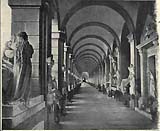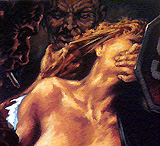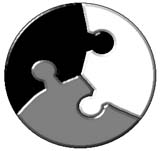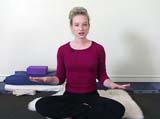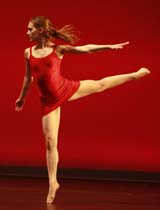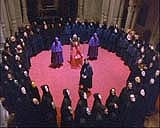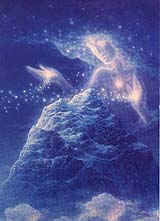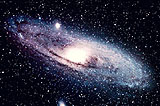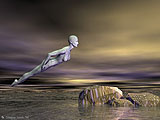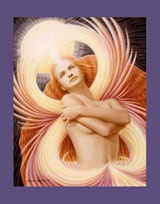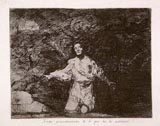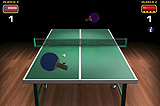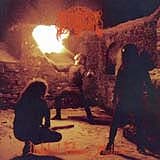Alchemy of the soul
Transforming Torture
Editor's note
The seventh chapter of Alchemy of the soul examines the lower ranges of the human being. As the horror of the human psyche emerges, so does the possibility of the soul emerging through it.
“Will you forgive me for making literal
an experience that seems?
more real than life, less possible
than death?
There is no place to put it, no way to hold it,
nothing to know it with
And yet it belongs, it stays, and it begs
consciousness...”
(My Heart, unpublished poem)
Julia’s words reflect her mythical journey between heaven and hell. Because the threads of her life’s tapestry originate in the under-world and the transcendental realms, this story of both torture and of a soul’s reclamation demands a new, extended paradigm of the psyche: this paradigm gives width and breadth to an experience that could be misdiagnosed as delusional or psychotic. Her process of self-awareness takes her deeper and deeper into hellish realms of abuse before a turnaround occurs. Gradually, however, her own experience of truth expiates her.
Julia interviewed me several times by phone before we met. I sensed a woman on the edge of either radical change or surrender to fear. Her mind, lucid and large, probed my experience, my training, my understanding of sexual abuse and normal sexual development. The depth of her questioning rose, not from curiosity, but from desperation. I passed the test and we scheduled our first session.
Verbally facile, Julia described in precise detail her past life with her family of origin; her present life in which she suffered from fear of intimacy with her husband; and her past confusing experience in therapy. Three themes dominated our initial work: sexual abuse by her older sister from age nine to eleven, beatings by her father from age three to twelve and the confusion caused by her last therapist who actually programmed his clients to believe that they were sexually abused.
None of Julia’s previous therapists focused on the trauma suffered as a result of abuse by her sister. When she related her experience with her sister, her last therapist immediately assumed that it was her father who had abused her, even going as far as to introduce images of sexual acts with him. Though disturbed by her sister’s behavior, Julia became confused. Were her sister’s explorations a normal part of sexual development?
Our work of bringing the traumatic impact of buried memories into consciousness began at our second meeting. Keenly aware of Julia’s experience of implanted memories, I decided to work through the body, using process acupressure. The first manipulation of extending her legs triggered a violent shaking throughout Julia’s body. This body memory helped her access further sensory channels. Slowly, she began to visually remember sexual play with her sister. Proprioceptively, she felt both the sexual stimulation and the physical revulsion. Once again, she heard her sister’s seductive call. Though dreading what would ensue, she could not say no: in a family devoid of affection, she had longed for physical intimacy.
Because of the intensity of the surfacing trauma, we had to extend the length of our sessions to two hours twice weekly, continuing this for two years. While we did not always use process acupressure, we always followed Julia’s bodily signals. These took many forms — pain beneath the shoulder blade, heat throughout the spine, dizziness, trembling... As we amplified each signal, long-forgotten parts of Julia’s story steadily emerged.
While Julia had been mentally aware of her sexual abuse, until now she remained unconscious of her physical/emotional trauma. Now she allowed the fear, sadness and shame to gradually enter her awareness. With this release came greater mental clarity. Obsessively staging sexual roles, Julia’s sister had assigned Julia the role of the man: She had to admire, touch, smell and taste different parts of her sister’s body. As Julia now became conscious of the part she had been forced to play, physical revulsion and nausea flooded her. She began to connect her early conditioning with the pain of later sexual relationships.
Julia’s therapeutic process was intense and layered. The incestuous relationship with her sister had inflicted a deep wound, but a deeper wound proved to be even more severe. What surfaced next was recall of physical abuse by her father.
Cultured and highly educated, an engineer, Julia’s father wanted his children to experience the ‘finer things of life’. A lover of music, he pressed them to study the violin, demanding perfection at every step. They also swam competitively, their father at pool-side, stopwatch in hand. Julia studied ballet and was taken to museums and concerts regularly by her parents. They were an upper middle-class, intellectual, Jewish family. This was the face presented to the world — the face held in Julia’s conscious mind.
One of the many deep flaws in this family portrait was the father’s terrible rage. For nine years he poured this rage onto Julia, claiming that she was a ‘willful child’ who needed discipline. Explosive emergence of this consciousness revealed Julia’s capacity to leave her body and enter other bodies. As we worked to release this new energy, she could no longer even remain on the massage table. Needing room to writhe and cower and groan as she relived her father’s wanton blows, she often appeared a crazed animal struggling for her very existence:
“When I swam around the inner cells,
Moved through blood, entered bones
Passed through skin to inhabit the bodies of
others,
I survived.
I left my own unprotected shell, organs
exposed
Frightened by frequent blows
Raging energy propelled me out
Thrusting me from my skin, my bones, my
cells
Shooting through my spine, amplified
Snapping it like a tree in a hurricane
Shattering it with currents of unimaginable
sensation.”
(Green, unpublished poem)
A force beyond Julia’s incest and her father’s brutality was now present — a force so dark and overwhelming that it drove her out of her body. We were entering the transpersonal realm. Julia began to remember leaving her body during times of abuse and assault and re-experienced this during our sessions. Mainstream psychology would not recognize the possibility of this phenomenon. The vast majority of psychologists would label this mode of survival as delusional, dissociative or psychotic.
Working with many trauma victims over the years, I have recognized two main modes of survival. One is where the consciousness remains within the body as it escapes into another part of the mind or personality (if the trauma is severe, this strategy can create multiple personality or dissociative disorder). The other is where the victim survives by leaving the body. This understanding of consciousness being projected outside of the body has been researched extensively by Kenneth Ring whose data revealed what he termed the near-death experience. Julia protected herself by leaving her body.
Julia’s memory of these monstrous attacks heightened her awareness of color. She perceived her father’s enraged energy in colors (hot pink and black). Other colors like yellow and green provided refuge.
“His was an ugly, raging hot pink, coated
sharply in thinly outlined black
An inflamed vein of hatred, he sent into my
small body
When he beat me with his open hand
Bone edges hard, flesh smoldering,
capillaries enlarged.”
(Wrenching, unpublished poem)
During our work, Julia’s spine became a barometer. Heat and sensitivity signaled the approach of dangerous forces. Too much force propelled her out of her body; a very delicate balance existed between her journeys to the dark side and the conscious world. She proceeded with great caution. “Will it ever be safe to fully occupy my body? Will I ever be able to trust another human being?”
Descending still deeper into the long-sealed corridors of her past, the reality of sexual abuse surfaced. Confused by the manipulative nature of her previous therapy, she doubted the veracity of incest images which were predominantly mental.
I steered clear of initiating exploration of incest with her father, until one day the violence of his beatings was replaced by the violence of rape. Julia tried to ignore the first influx of images, but she suffered such visceral repercussions that she could not dismiss them. Often they bypassed her visual perception, arriving somatically — revulsion, shame, need and sexual arousal.
“Can we create a universe not adverse to my
speaking
Can we call up, evoke a goddess
Who can spread her transparent, finely
patterned cape
sheer as a veil, around me
Expansively casting over us
A gentle epidermis of acceptance.”
(Taken, unpublished poem)
Breaking the secrecy, a conditioning that insulated the family, was a formidable task.
“He,
He touched me,
He used his mouth
He entered me and that was not enough
in his torpid eyes
He laid his mouth upon my breast
So new, made so old
Woven of confusing veins”
(Taken, unpublished poem)
At age twelve, Julia confronted her father,
“You cannot beat me any longer; if you do, I will leave.”
He stopped. However, two years later, after her older sister graduated and left home, her father’s violence returned in the form of rape. She was victimized until she went to college at age eighteen.
Julia continued to question whether she was creating this rape in her mind. However, re-experiencing it again and again, she even remembered that the violence with which he raped her paralleled the violence of his beatings. So intense was the energy in her spine during these assaults, that she imagined he had connected her to an electrical device. Although Julia’s spine was strongly activated during these remembered rapes, she was unable to leave her body. Instead, she escaped by entering patterns in the rug, a painting, a tree. She also entered her father’s body. Here she experienced energetically his twisted, poisonous rage. Virtually devoid of feeling, like most sadists, he could evoke emotion only through violence. Hurting Julia had unleashed his sexuality.
Julia had yet to confront her most devastating demon. Painfully aware of the roles of her colluding sister and brutal father, she questioned, where her mother had been during this long, incestuous drama.
Descent to the primal depths of Julia’s torture was initiated in a process acupressure session. As she recalled a group of people surrounding her, a sharp pain shot through her vagina. She was lying naked on a table while a woman inserted a metal object. Julia identified this woman as her paternal grandmother. Her father was also present. As this bodily sensation and the visual memory coincided, her back arched and her entire body lurched backwards. If I had not been there to catch her, she would have catapulted onto the floor. As I eased her to the ground, her body alternated between quaking and spasm. She lunged around the room trying to find asylum. Finally, she gripped me fiercely.
Julia had lifted a corner of the veil concealing a chaotic world of evil she had never imagined. Deeply shaken, she retreated to the safety of her rational mind. For several weeks we consciously avoided accessing the unconscious.
Ready to work at this deeper level, I decided to use holotropic breathwork. The gestalt of reclining on pillows while I watched her breathe recalled something familiar to Julia. She propelled herself backwards, as if to escape a pursuing force, slid across the floor and curling into the fetal position, pressed her back against the wall. Repeatedly, she retraced this pattern.
The force of the loud music as I witnessed her proscribed breathing had been overwhelming. Suddenly, she remembered a group of people gathered round her like sexual vultures. After this session Julia became very angry. She blamed me for subjecting her to ‘being watched’. She blamed me for subjecting her to holotropic breathwork. Processing this anger for many weeks, we sorted out feelings of betrayal. Ultimately, Julia’s healing process was served.
Her growing awareness of abusers beyond her sister and father triggered further realizations. She began to understand her fear of group participation. Though trained as a dancer, Julia could not tolerate being viewed while performing. As a result, she had not danced for years. As we uncovered details of group abuse, she began to dance by herself. Armed with a portable CD player and headphones, she discovered secluded meadows where her only audience was trees and sky. There she began to recover further opening into the world of spirit.
“The contact I receive when dancing is...I am graced by presence, presence of beings, guides, voices to lead me, to bathe me in divine grace, in beauty — it is nature, sun, air, insects, light, sky and clouds. And it is the very soil, solid ground on which I stand and then move to step and swing and turn and lean into air and fall back into sky — and dance with the goddess in love and joy and the sorrowful sadness that I am and have been for so long.”
Julia’s return to dance became a spiritual path, a way to heal. However, psychological recovery and discovery occurred simultaneously.
The entry of Julia’s controlling mother into her story intensified our work. While they had done battle all her life, Julia dearly loved her mother and sought to protect her. Having contracted cancer when Julia was a toddler, she used her illness to manipulate the family. Though she forbade her family to speak of her condition, Julia was consumed with worry. Her mother’s disease served another purpose, however. It obstructed a more pervasive family disease — abuse.
Julia’s life-long efforts to protect her mother were not reciprocated. Her daughter’s pleas for protection were met with graphic stories of beatings she had received when she was a child. Her constant refrain: “I had it much worse than you.”
Suddenly, during a process acupressure session, Julia at last perceived her mother’s involvement in the ritualized abuse:
“We are in the basement of my childhood home. My father has me bent backwards on the ping pong table. He is raping me. Bright lights are shining in my eyes. My uncle is watching and my mother comes down the stairs with a knife.”
This level of terror overwhelmed Julia. This descent from sexual abuse, beatings and rape, to group sex left Julia with no ground to stand on.
“Am I crazy? My story is far too bizarre to be true!”
Face to face with her mother as madwoman, Julia needed a cognitive framework. I decided to explore her mother’s family of origin. Her mother’s paternal family had been orthodox Jews. She too had been beaten by her father and older brother. Although Julia’s mother was not religious and presented a highly rational exterior, she sometimes quoted the Old Testament scriptures. These passages arose and were delivered in a deep male voice as if another personality had rushed forward. Both Julia and her sister were disturbed by these eruptions — a bizarre juxtaposition to their mother’s atheism. Equally bizarre was the relationship between her mother and uncle. Her mother deferred to and adulated her domineering and condescending brother. Julia’s experience of her uncle utterly confused her. He fawned over her in early childhood, feeding the family myth of ‘Julia, the strongest girl in the world’. During her teenage years, however, he periodically shamed her until she felt worthless. Though the puzzle of her mother’s life remained a mystery, she became aware of the confusing and detrimental triangulation she experienced with her mother and uncle.
With a renewed aspiration for truth, she again plunged into the hidden world. Now she was guided by a strong bodily symptom — a sharp pain under her right shoulder blade. Simply placing my hand there facilitated her descent to yet another level of chaos — a chaos created by her mother and uncle.
Julia’s body became incredibly rigid followed by violent shaking. Periodically, she attempted to escape by pushing backwards until she was sitting on top of the couch’s back support. Screaming and moaning, she held on to me in a vice-like grip. After thirty minutes, this struggle ceased and she became very quiet, resting in this space for another thirty minutes. Later, she described her experience:
“I am lying naked on a slab of marble before an ornately carved altar. The Dark One my uncle worships, is present. My uncle sits me up and holds me while my mother cuts me under the right shoulder blade. She catches my blood in a vessel. A small dog laps the liquid. Then, she gives me to my uncle as an offering, and gives my blood to the Dark One.”
As a child of four, Julia met the reality of evil, a reality she met many times on her journey with these strange people. This contact with ritualized abuse soon became dream-like. “How is it possible? Not my family!” In trauma work this need to distance is crucial, lest the victim be consumed in the horror.
Each time Julia revisited this darkness, a similar pattern ensued: a struggle, then quiet. One day, during the quiet, she described a beautiful woman, gentle yet powerful, who came and took her to the ‘Other Place’. She called her the goddess, the Divine Mother. After repeated visitations during her travail, Julia realized she could not have survived this darkness without Her.
“...She took me to that Other Place: calm, beautiful, quiet — where I float and am free from the abuse. She is the essence of the Feminine...touches me with the most loving touch... lifts me and flies me away. She came to get me. I couldn’t leave by myself.”
At this young age, the combination of her father’s brutality and the ritualized torture demanded a powerful, loving intervention; anything less might have condemned Julia to either death or insanity. These appearances of Julia’s Divine Mother in our work led to an ongoing relationship with a higher power whose presence evoked trust. Eventually, she no longer needed the stimulus of crisis to call forth the goddess. She appeared in her multitude of forms and conveyed her power in the joy of dance:
“...I am totally connected to a power that is good and strong in earth and wind and sun. I dance in this place and the grass rises to meet me. The mountain towers before me, up the hill it rises and I move amongst...nature’s creatures who dart in and out. I speak to the trees and the hedges embrace me. I am one with all these forces...feeling the messages come down through my arms, into my core, up through the soil and into my hips, through the very pores of my skin as I open to the blissful ease of moving in my own dance — given to me by the goddess.”
Fortified and renewed by these contacts, Julia continued to expand her awareness of the underworld. Further exploration of the early ritual abuse revealed the torture and death of animals. Julia’s terror and revulsion was accompanied by a deep compassion and fellow-feeling for these creatures. Gazing into their eyes, she realized their commonality of soul before their tormenters’ soul-less forms.
Touching the grisly details of the animal sacrifices and her identification with them provided a launching pad for galactic travel. Julia rushed through her spine, out the top of her head “...into dimensions so far beyond human capacity...star years, galaxies, huge space, a void.” One day, after taking this escape-route, she experienced great difficulty returning. Guiding her to a sand tray, I encouraged her to bury her hands; this helped her re-enter her body.
After numerous instances of verifying she was adept at leaving her body, Julia announced that she wanted to stay in her human form. She had a work to do on the earth and she wanted to experience loving relationships.
“I traveled out so far into the galaxy, I became a star. I went light years out and yet, for the first time, I wanted to come back. I didn’t want to explode like a star, lose form, never be in a human body again. I asked to return.”
Julia’s realization and choice marked the major turning point in her work: to choose life in a body, in a mind that had been so tortured. Paradoxically, uncovering the dark side had led her beyond shame and self-loathing to the discovery of her gifts, her essential core.
Realization of these gifts came one evening while giving her daughter a bath, Julia stretched out on the floor and gazed out the window:
“Suddenly, I realized, I just went into a tree. I do this; I go into trees; I move between and into other dimensions. I exist on many more levels besides the concrete, the rational. My image of myself and my attachment to it is dissolving as I allow these powerful aspects of myself to emerge. I cannot deny them — my time-traveling, my out-of-body experiences, my transpersonal contacts with other beings, my receiving messages from other realms — my existence on subtler levels.”
Julia’s ever deepening excavations eventually brought her to full awareness of her essence, her “...deep connection to forces — light and dark; beautiful and divine; healing and powerful; truthful and strong.”
* * * *
Julia and I created a sacred space, a space both free and protected, where her story could safely unfold. Besides extended therapy sessions, she wrote prolifically. Using her writing as a means of connecting to herself and communicating with me, Julia kept an extensive journal and created a large body of work with her poems. The shame and revulsion, too terrible to utter, were conveyed poetically. She began the awesome work of rebuilding relationships by expressing her most intimate thoughts to me. Unveiling the battle of her early life, she recovered parts of self, crucial to her search for wholeness — parts often identified with heaven and hell. Again and again, she entered the dark recesses of the underworld, discovering not only the origin of her trauma, but the power to heal it. Like the archetypal journey of the hero/heroine, the woman who returned had undergone a radical transformation. Now, the work of integrating this new self into her present life would begin.Julia had to sever many relationships in her battle for soul: her sister and father, neither of whom could face her terrible truth, several women friends who abandoned her in the worst of times. Julia’s mother had died several years prior to our work. Still shaken from her dark passage, she stood naked before the awesome work of re-creating her life.
Bearing open wounds of sexual violation, Julia dared to move towards her husband. Longing for an intimacy they had not known, she shared her most humiliating discoveries — opening to him amidst intrusive phantoms of the past. Discovering a balance was precarious; a moment of tenderness was often followed by weeks of estrangement. A work of this magnitude proceeds only through deep love and perseverance. Rather than focusing on lofty goals, she learned to focus on the process — finding joy in small gains.
Julia’s relationship with her daughter revealed the highest levels of love, nurturing and care. She embodied the archetypal essence of mother and yet could not shield her child from the fear that held her prisoner. Confronting her own fear helped her address her overprotectiveness. This ranged from mistrusting her husband’s care to her own exhaustion from years of overzealous attention to her daughter. True to her warrior spirit, Julia quickly acted to change the skewed family dynamics.
Julia’s life-long search for divinity, in the form of the feminine, rose with a renewed fierceness. Her relationship with the Divine Mother continued in ritual, dance and everyday spirituality. This inner connection amplified her movement towards other women. Terrified of intimacy with women because of her mother and sister’s betrayal, she adopted the role of caretaker rather than friend in feminine relationships. Now, possessing a new awareness and strength, she is confronting this fear on many different levels. The most direct mode of confrontation lies in the telling of her story — an action that would have earned her torture or death in her childhood. A participant in a group of female trauma survivors, Julia has practiced sharing her truth, and has been received with great care and compassion. This vehicle, coupled with her strong aspiration for authentic relationships, continues to open new doors with women.
Julia looks upon the world with unveiled eyes. Her family of origin is gone and many illusions about her identity are also gone. Once familiar ways of perceiving herself and her world have changed. She has gazed into the eyes of death. She has gazed into the eyes of evil. But though she was forced into a world of fear and evil, she has received the touch of a divine, feminine presence she holds sacred and who, in turn, holds her sacred. Julia now possesses a radically different experience of reality, a battleground for light and dark forces:
“My precarious, precious life
Given to me in trust by the Goddess
Was quickly torn asunder, not by blunder,
by forces wrenching
Creating intentional tears, much harsher
than broken threads.
Deep within, my soul was called upon early
To meet an evil maker
The destroyer of hearts
Dark beings that wind their way through
the universe
looking for a warm seat.
At some point yet unrevealed
My biological family
Welcomed these unholy forces
Into our artfully decorated house.
How many generations back from what
dark region of our Jewish past
These seething multi-limbed entities came
I cannot trace.
I only know they lived in my childhood
home.
Amongst the Danish modern furniture of
our living room
Upstairs in the closely situated bedrooms
Downstairs in the fluorescent lit ping-pong
table basement
Like they owned the property.
How the malignant gray energy matter
manifested
In each of my assimilated relations
Was distinct
And corrupt.”
(Wrenching, unpublished poem)
Julia’s life reveals an interwoven fabric of personal and transpersonal realities. She learned very early that human incarnation conferred the power of choice. Her family of origin welcomed “unholy forces” into their midst, and intentionally coerced her to make the same choice:
“They tried to make me over
In their images.
Like mother, like daughter
Like sister, like brother.
I would never be alone, they promised,
If I followed in their footsteps
Empty formless chaos of muddy, shoeless
outlines
Imprints of non-beings.”
(Wrenching, unpublished poem)
In the face of such horrific forces what devices did Julia possess to oppose them, to follow her truth? She did not perpetuate this line of intergenerational abuse. However, her reasons for success transcended her personal attributes:
“To name them — physical strength, fierce
will, resilience, the ability to fight
Does not explain what came from beyond
on my behalf
What had genuine feminine attributes and a
soft touch
A long reach and a ceaseless love.
I would not have made it without Her
She who arrived to carry me away
Effortlessly removing me from my shocked
and shattered body
And revealing to me the Other Place...”
(Wrenching, unpublished poem)
Direct contact with the transpersonal healing power of the Divine Mother, Julia’s strength of soul coupled with a strong personality, the strength of our relationship — all uniting to do battle with these dark forces — convey a mythical dimension to her story. Unbroken, she is consciously stepping into the role of wounded healer. The reclamation of her gifts to perceive and work with the life-force in the body has granted her skillful means to serve others. Considering the magnitude of this work, Julia’s choice is a testimony to the efficacy of her own healing.
Dr. Arya Maloney is the co-founder of the Mindbody Centre in Kingston, New York and holds three graduate degrees in chemistry, theology and psychology. He has been teaching in colleges and universities.
Share with us (Comments, contributions, opinions)
When reproducing this feature, please credit NAMAH, and give the byline. Please send us cuttings.





